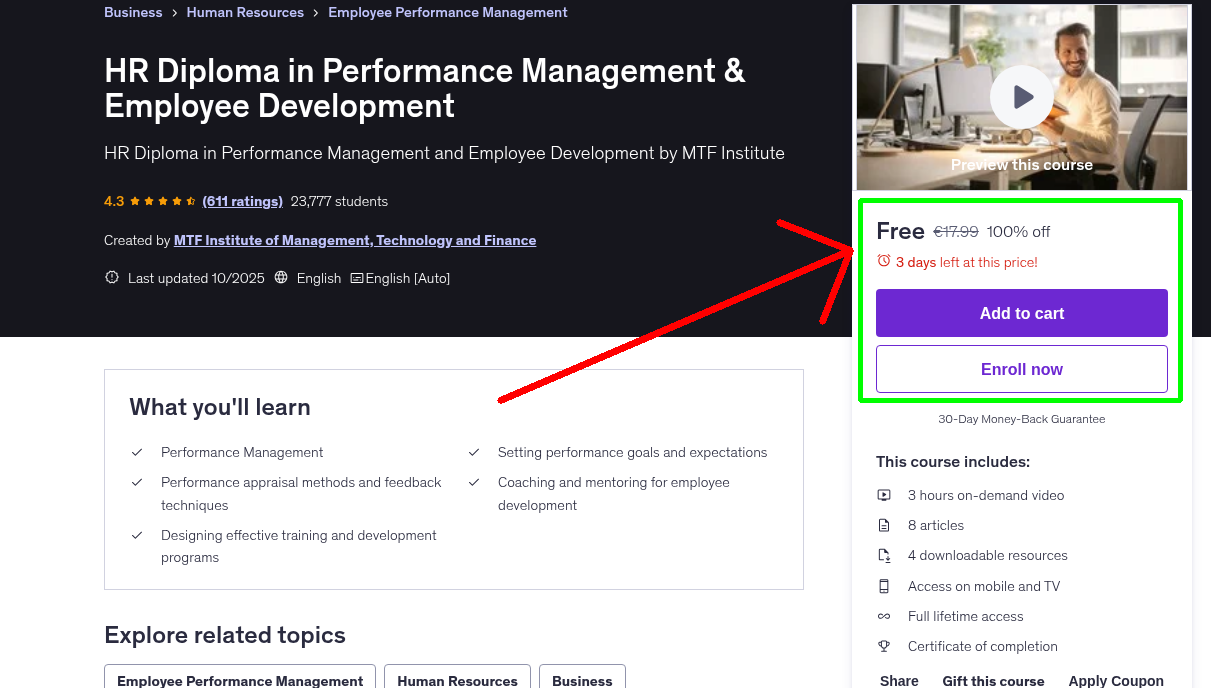
What You'll Learn
- Performance Management
- Setting performance goals and expectations
- Performance appraisal methods and feedback techniques
- Coaching and mentoring for employee development
- Designing effective training and development programs
Requirements
- For a better learning experience, we suggest you to use a laptop / mobile phone / pen and paper for taking notes, highlighting important points, and making summaries to reinforce your learning.
Who This Course is For
- No special requirements. Course for any who want to build a career at Human Resources or improve their knowledge.
- In the field of human resources, setting performance goals is a critical aspect of managing and developing employees. Performance goals are specific targets or objectives that individuals or teams are expected to achieve within a given timeframe. These goals play a fundamental role in driving employee performance, aligning organizational objectives, and fostering continuous improvement. We will explore the significance of performance goals in the realm of human resources and the benefits they bring to both employees and organizations.
- 1. Clarity and Focus: Performance goals provide clarity and direction to employees. When employees have clear goals, they know what is expected of them and can focus their efforts on achieving those objectives. Setting specific, measurable, achievable, relevant, and time-bound (SMART) goals helps employees understand the desired outcomes and enables them to prioritize their tasks effectively. 2. Motivation and Engagement: Well-defined performance goals have a motivational effect on employees. When employees have challenging yet attainable goals, they are more likely to feel engaged and motivated to perform at their best. Goals create a sense of purpose and provide a framework for employees to channel their energy and expertise towards achieving desired outcomes. They can enhance job satisfaction and increase employee commitment to the organization.
- 3. Performance Evaluation: Performance goals serve as a basis for assessing employee performance. By setting clear objectives, managers can evaluate and measure the progress and achievements of employees. Regular performance evaluations help identify areas of improvement, provide constructive feedback, and recognize top performers. Objective evaluation criteria linked to performance goals ensure fairness and transparency in the assessment process. 4. Skill Development: Performance goals create opportunities for employees to develop and enhance their skills and competencies. By setting goals that require employees to stretch beyond their current capabilities, organizations can foster a culture of continuous learning and development. Employees are motivated to acquire new knowledge, acquire relevant training, and seek growth opportunities to meet or exceed their goals. This, in turn, benefits both the individual and the organization by building a skilled and capable workforce.
- 5. Alignment with Organizational Objectives: Performance goals play a crucial role in aligning individual and team efforts with the broader organizational objectives. When goals are set in line with the strategic priorities of the organization, employees understand how their work contributes to the overall success of the company. This alignment promotes a sense of organizational unity and helps employees see the bigger picture, fostering a collective effort towards achieving organizational goals. 6. Accountability and Performance Improvement: Performance goals create a sense of accountability among employees. When employees have clear goals and know they will be evaluated based on their performance, they are more likely to take ownership of their work and strive for excellence. Goals also provide a basis for identifying performance gaps and areas that require improvement. Managers can offer support, guidance, and resources to help employees overcome challenges and enhance their performance.
- Performance goals are a vital component of effective human resource management. They provide clarity, motivation, and focus for employees, facilitate performance evaluation and skill development, align individual efforts with organizational objectives and foster a culture of accountability and continuous improvement. By recognizing the importance of performance goals, organizations can drive employee engagement, productivity, and ultimately, achieve their desired outcomes.
Your Instructor
MTF Institute of Management, Technology and Finance
Institute of Management, Technology and Finance
4.4 Instructor Rating
100,250 Reviews
961,984 Students
274 Courses
Never Miss a Coupon!
Subscribe to our newsletter to get daily updates on the latest free courses.



